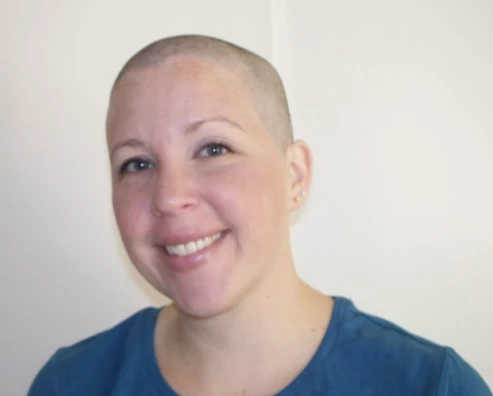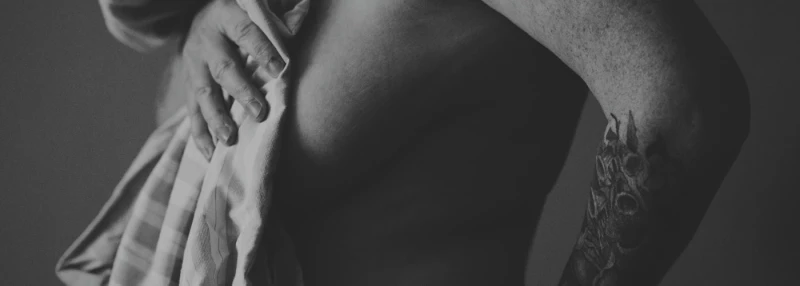I don’t know how else to describe it – I faked my emotions during my cancer diagnosis and treatment for breast cancer. When I was diagnosed with stage 1 ER+ breast cancer back in 2010, I was 32 years old. I knew just about no one my age or younger that had or had dealt with a cancer diagnosis. Well, let me change that statement: I knew exactly NO ONE with cancer. I had no clue how to act, what to say or what to do.
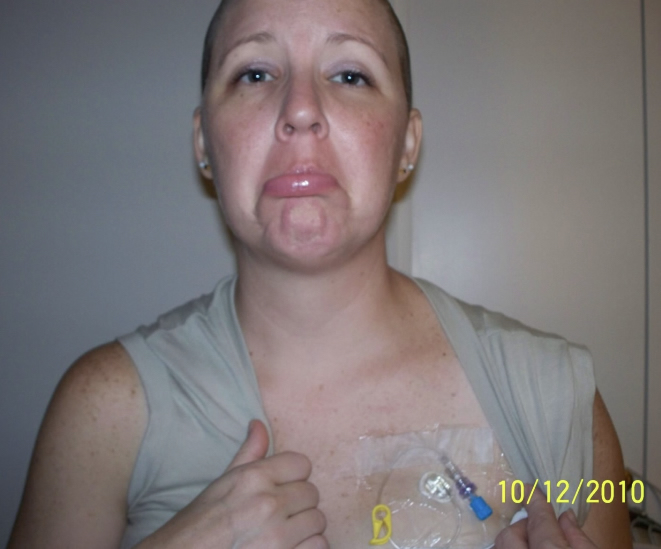 The strangest part was I was more worried about everyone else’s reactions more than my own. Would my parents be okay? How would they deal with it if I died? What about my friends? Would they think talking to me or being close to me would magically spread the cancer to them? Emotionally, how would they handle a friend their age dying so young?
The strangest part was I was more worried about everyone else’s reactions more than my own. Would my parents be okay? How would they deal with it if I died? What about my friends? Would they think talking to me or being close to me would magically spread the cancer to them? Emotionally, how would they handle a friend their age dying so young?
I forgot the one thing I should have focused on first and foremost and that was how I was feeling. Don’t wait for some miracle sentence I am about to write that says that I woke up one morning and realized I needed to take time for myself and worry about my emotions. This story does not have that ending.
Faking It
“To the outside world, I pretended having cancer was the easiest thing to face while inside I was in a mental war so exhausting that I wasn’t sure I’d survive it.”
I happily skipped along through my diagnosis and breast cancer treatment singing a beautiful song of happy words with a chorus that just repeated “Oh, I am just fine!” over and over and over again. I walked around bald with a lovely smile that was used so much I thought about having it permanently tattooed onto my face. I figured that would be less work than having to work those smiling muscles day after day after day.
To the outside world, I pretended having cancer was the easiest thing to face while inside I was in a mental war so exhausting that I wasn’t sure I’d survive it. I was drowning in fears and sorrows but I was terrified to show it to the outside world.
When my surgeries and chemo ended, I decided to go back to my old life. The problem was, no matter how hard I searched for or tried to bring her back to life, I couldn’t find her. I had no clue who I was anymore. I covered that up with more lies to my friends, family and most of all me.
Good thing I had an “Encyclopedia of Dana” in my brain. In there, I had different emotional reactions from my old self that I could easily fake when around friends and family. It was filled with things like “Dana Is Happy When” or “Dana’s Tactics To Pretend She is Not Worried About Cancer.” I would refer to that when I needed a response when people asked me how I was doing.
It was easy to hide out inside my head. My actions were winning the game of deceit. I forced myself out of bed each day. I went to work each day. I went out with friends, traveled, and celebrated at family functions.
The Truth About Breast Cancer and PTSD
Now here is the truth behind all that: whenever I was out of the public eye or at home by myself, the PTSD that I didn’t know I had would start its evil game. I had triggers at every turn that would remind me of how horrible cancer truly was and how much it had destroyed me mentally.
"I was ignorant and assumed you could only have PTSD after fighting in a war or having been involved in something so unbelievably traumatic."
Let’s start with how the PTSD put a massive blanket over my eyes for the first 4 years following treatment. I had no idea I had PTSD from breast cancer. Yes, I was ignorant and assumed you could only have PTSD after fighting in a war or having been involved in something so unbelievably traumatic.
I didn’t realize cancer was something so unbelievably traumatic.
Newsflash: It is.
I was triggered every time I had an ache, pain, heard a story of someone’s cancer diagnosis, heard of a death after cancer, was in a doctor’s office, or was somewhere that smelled like the hospital.
The only way I can describe it is this: you are suddenly blacked out from the actual time or place you are standing in and then sent back to that moment of fear like the cancer diagnosis, or feeling the lump, or starting chemo, or whatever it is that is so horrible to you. All I saw was me at that moment when the doctor told me I had cancer. I couldn’t snap out of it.
Checking My Body Raw
For me, other triggers of PTSD after breast cancer were the need to constantly check my body for lumps. This is where I was physically self-destructive. I would spend hours (this is not an exaggeration, by the way) rubbing my armpits, breast implants, neck, and collarbones looking for lumps or enlarged lymph nodes.
Anytime I was in a room where I could close the door and be by myself, I would check and check and check my body. It got so bad I would rub the skin raw around my collarbones and armpits to the point where it would bleed. It was impossible to explain to anyone how I got that sore on my neck. So, I would hide it with scarves and turtlenecks. I got really good at it too.
I felt like I was an addict covering up drinking or drug use. Then that felt weird to me because I did none of those things. So I told myself more lies about my true emotional state. I figured it was normal because I had had cancer. So as long as I kept it quiet, no one would know.
Discovering PTSD in Therapy
“In therapy I was told I had PTSD. It started making sense. The triggers, the lying to friends and family about my emotions, the pretending to be who I was. It all became clear.”
It was at the end of the fourth straight year of constantly hiding behind closed doors and turtle necks that I realized I had a very serious problem. Getting out of bed was almost impossible because I couldn’t face the way my body was starting to look physically and feel mentally. I couldn’t handle another 6-7 hours of rubbing my body looking for lumps.
Reach Out
One day I sat in my car after driving home from work and just stared at a phone number in my hand willing myself to dial. I needed to start talking to someone ASAP or this self-destruction would take me down. I made the move and started therapy within the week.
This is the part where I start to get happy again.
In therapy I was told I had PTSD. It started making sense. The triggers, the lying to friends and family about my emotions, the pretending to be who I was. It all became clear. During therapy, I had uncovered I didn’t remember the first year after cancer.
This isn’t me saying that oh I don’t remember bits and pieces of that year. No, this is me stating that I don’t remember virtually anything after that first year of cancer. It’s been almost eight years since I lived that year of 2011 and I am sorry to say I still don’t remember much of it. We are working on it. But a lot happened emotionally and physically that year that I just can’t seem to face.
PTSD After Breast Cancer
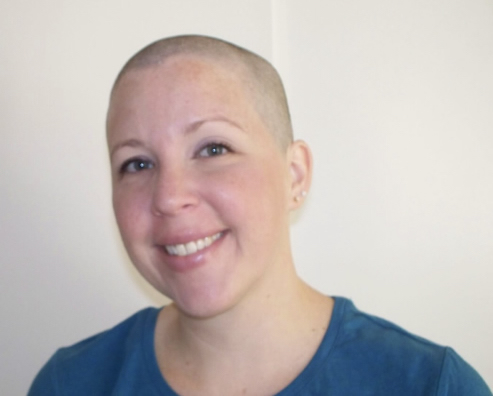 I was embarrassed, afraid and ashamed as those years passed after my cancer diagnosis. No one else around me seemed to struggle like I did. I did nothing but compare myself to everyone else I had met facing cancer. They all seemed to handle it so much better than me. I assumed I was just a failure and welcomed the self-destructive behavior. In my mind, I figured at least I would find my cancer the moment it returned. My body had failed me once. There was no way I would let it again.
I was embarrassed, afraid and ashamed as those years passed after my cancer diagnosis. No one else around me seemed to struggle like I did. I did nothing but compare myself to everyone else I had met facing cancer. They all seemed to handle it so much better than me. I assumed I was just a failure and welcomed the self-destructive behavior. In my mind, I figured at least I would find my cancer the moment it returned. My body had failed me once. There was no way I would let it again.
I have learned a lot about who I once was and I now know who I am today. She’s a different person, no doubt. I kind of like her though. She’s a warrior that has been through a lot. She’s accepting and not embarrassed anymore about what she did to her body. She’s taking care of herself and learning about what was once blocked out by PTSD.
She knows that there will be tough days and she knows how to handle it.
She is me.
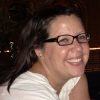 Dana was diagnosed with stage 1 ER + breast cancer in 2010 at the age of 32 years old. She volunteers with Young Survival Coalition as an Illinois State Leader and RISE Advocate. After diagnosis and treatment, survivorship was the toughest challenge in her cancer journey. A focus on life after cancer helped her to co-found The Dragonfly Angel Society – Cancer Survivorship, which is a non-profit that helps cancer survivors find survivorship resources that suit them and get on with the “now what” of their life after cancer.
Dana was diagnosed with stage 1 ER + breast cancer in 2010 at the age of 32 years old. She volunteers with Young Survival Coalition as an Illinois State Leader and RISE Advocate. After diagnosis and treatment, survivorship was the toughest challenge in her cancer journey. A focus on life after cancer helped her to co-found The Dragonfly Angel Society – Cancer Survivorship, which is a non-profit that helps cancer survivors find survivorship resources that suit them and get on with the “now what” of their life after cancer.

